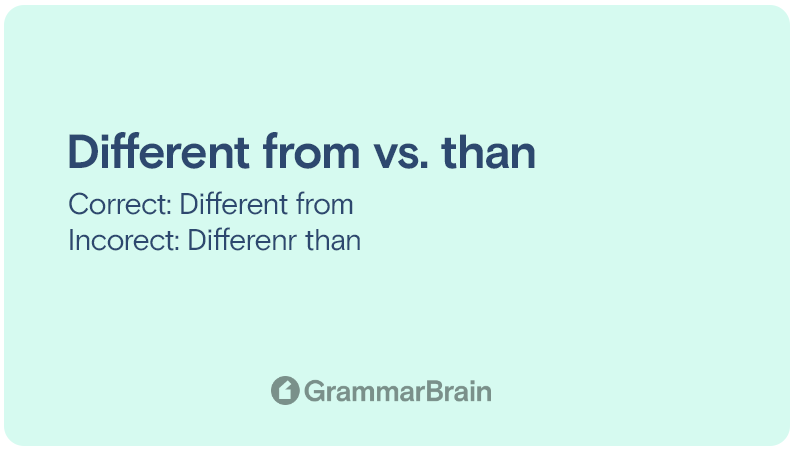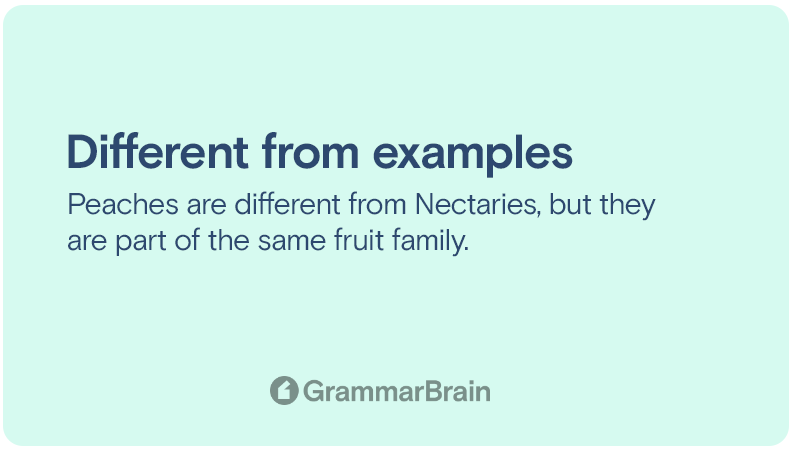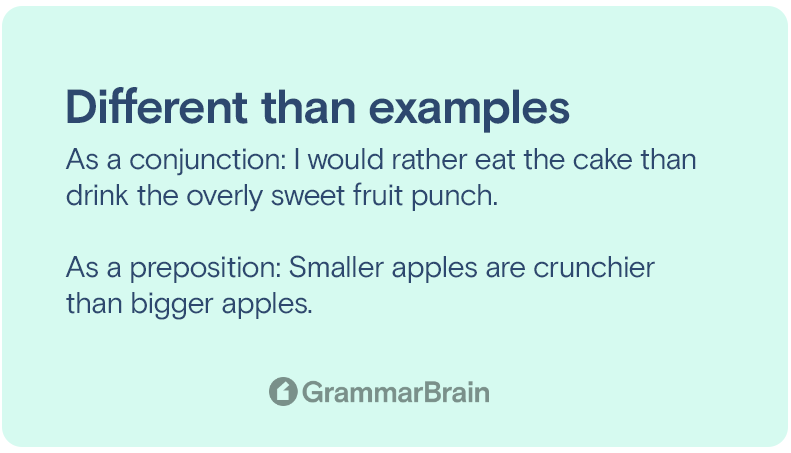Is it “different from” or “different than?” Sentence writing, while seemingly simple, becomes a rather daunting task due to confusion surrounding the usage of words and phrases. Take for example the confusion regarding the usage of the phrases ‘different from ‘and ‘different than.’
However, to understand the correct phrase that can be used, it is essential to first understand them individually.

What does “Different From” mean?
The word “from” is among the most commonly used prepositions in the English Language. It represents a distance between a group of things.
It also represents a source of something, a cause of something, or a basis for the existence of something.
Clearly, it is a very versatile and malleable preposition that can be used in multiple places.
For instance:
- As a physical distance: Nia lived 45 miles away from her grandmother’s house.
- As a source: The case laws in this legal compendium were picked from the archives of the 6th circuit court.
- As a basis: Based on the information gathered from the fossils collected in the recent archeological dig, it was concluded that there was a species of dinosaurs that could fly.
The phrase “different from” indicates a comparison between two or more things, animals or people. This phrase is commonly used and is always correct. The phrase is grammatically sound and is accepted by scholars for literary as well as casual usage alike.

Example:
- Peaches are different from Nectaries, but they are part of the same fruit family.
- India is a country of many cultures, the North Indian states are vastly different from the South Indian states.

What does “Different Than” mean?
To understand what the phrase “different than” means, it is first essential to understand the word “than”. The word “than” can be a preposition as well as a conjunction.
Conjunctions are words that connect two or more words, sentences, or parts of a sentence together.
In the capacity of a preposition, the word “than” represents the last of a group of things, animals, or persons being compared with each other. Let’s look at some examples to understand this better.
- As a conjunction: I would rather eat the cake than drink the overly sweet fruit punch.
- As a preposition: Smaller apples are crunchier than bigger apples.
The phrase “different than” is a highly contested one. While it is accepted by some for casual as well as literary usage, most scholars agree that this phrase is grammatically incorrect.
This is because the word “different” is not a comparative word.
As such, its usage along with the word “than” is considered incorrect.
Though some authors have used the phrase “different than” in published works, instances of this are very rare. To avoid causing a conflict or risking incorrect usage, utilization of the phrase “different from” should be adopted.
How to use “Different From” and “Different Than” in a sentence
The phrase “different from” is used in the context of comparison. To use it correctly in a sentence, it can be used in the following manner:
- Gorillas are very different from Orangutans even though they are both Monkeys.
- Ryan and Sean are very different from each other despite being twins.
The phrase “different than” can be accompanied by a clause in a sentence. It can be used in the following manner:
- Maya’s experience in Florida was very different than what she expected.
- Paul’s attitude was very different than the last time I met him.
FAQs
Even though both “different from” and “different than” are considered standard by some, many still consider “different than” to be incorrect usage. Whereas, “different from” is accepted everywhere and by everyone.
What is the difference between “different from” and “different than”?
The main difference between “different from” and “different than” is that the phrase “different from” is typically followed by a noun. On the other hand, the phrase “different than” is usually followed by a clause.
Sources
- Different From or Different Than?
- Is it Different Than or Different From?
- Should it be Different than or Different From?
- Different From, different to or different than?
Inside this article
Fact checked:
Content is rigorously reviewed by a team of qualified and experienced fact checkers. Fact checkers review articles for factual accuracy, relevance, and timeliness. Learn more.
Core lessons
Glossary
- Abstract Noun
- Accusative Case
- Anecdote
- Antonym
- Active Sentence
- Adverb
- Adjective
- Allegory
- Alliteration
- Adjective Clause
- Adjective Phrase
- Ampersand
- Anastrophe
- Adverbial Clause
- Appositive Phrase
- Clause
- Compound Adjective
- Complex Sentence
- Compound Words
- Compound Predicate
- Common Noun
- Comparative Adjective
- Comparative and Superlative
- Compound Noun
- Compound Subject
- Compound Sentence
- Copular Verb
- Collective Noun
- Colloquialism
- Conciseness
- Consonance
- Conditional
- Concrete Noun
- Conjunction
- Conjugation
- Conditional Sentence
- Comma Splice
- Correlative Conjunction
- Coordinating Conjunction
- Coordinate Adjective
- Cumulative Adjective
- Dative Case
- Determiner
- Declarative Sentence
- Declarative Statement
- Direct Object Pronoun
- Direct Object
- Diction
- Diphthong
- Dangling Modifier
- Demonstrative Pronoun
- Demonstrative Adjective
- Direct Characterization
- Definite Article
- Doublespeak
- False Dilemma Fallacy
- Future Perfect Progressive
- Future Simple
- Future Perfect Continuous
- Future Perfect
- First Conditional
- Irregular Adjective
- Irregular Verb
- Imperative Sentence
- Indefinite Article
- Intransitive Verb
- Introductory Phrase
- Indefinite Pronoun
- Indirect Characterization
- Interrogative Sentence
- Intensive Pronoun
- Inanimate Object
- Indefinite Tense
- Infinitive Phrase
- Interjection
- Intensifier
- Infinitive
- Indicative Mood
- Participle
- Parallelism
- Prepositional Phrase
- Past Simple Tense
- Past Continuous Tense
- Past Perfect Tense
- Past Progressive Tense
- Present Simple Tense
- Present Perfect Tense
- Personal Pronoun
- Personification
- Persuasive Writing
- Parallel Structure
- Phrasal Verb
- Predicate Adjective
- Predicate Nominative
- Phonetic Language
- Plural Noun
- Punctuation
- Punctuation Marks
- Preposition
- Preposition of Place
- Parts of Speech
- Possessive Adjective
- Possessive Determiner
- Possessive Case
- Possessive Noun
- Proper Adjective
- Proper Noun
- Present Participle
- Prefix
- Predicate



